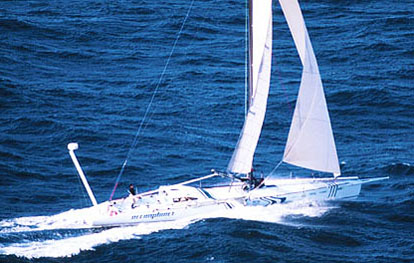More Details - and Confusion - on the
Apparent Elimination of Domestic Clearing in Mexico
April 20 - Mexico City
Legislation to get rid of domestic clearing
in Mexico has been before Congress in different forms for several
years. Sources tell us that it never passed because the "mafia-like"
group that controls the pilot boats that guide ships in and out
of ports has been able to thwart it. If the legislation had passed,
it apparently would have drastically reduced the profits in their
very lucrative business.
Then last fall President Fox asked various
members of the tourist industry what he could do to make Mexico
more friendly to tourism. Tere Grossman, President of the Mexican
Marina Owners Association, told Fox to get rid of domestic clearing.
With the legislation still blocked in Congress, Fox finally got
around it by issuing yesterday's Reglamento, which is a Presidential
directive that doesn't require the approval of Congress.
We'd like to tell you that the Reglamento
is absolutely clear and everyone is interpreting it the same
way. But it's not as clear as it could be, and people are interpreting
it differently - or just aren't sure how to interpret it. It
pretty clearly seems to state that the only despacho or
clearance that a foreign-flagged pleasure vessel needs is an
altura, which is the international one used only when
arriving from or leaving to a foreign port. By saying that an
altura is needed "exclusively," and not mentioning
the other two types of despachos, it suggests that the
other two aren't needed. The other two are the interior
- needed when going out for just a day, and inexplicably only
ever enforced in Cabo San Lucas - and the cabotjaje -
which is the despacho for going between port captain districts.
However, after the initial check-in with
a port captain, it also says that such boats have to "inform"
a marina when they are coming or going, and that the marina has
to keep a "log book" of such comings and goings. If
there is no marina, such boats are supposed to inform the local
port captain. According to Grossman's way of thinking, "informing"
could consist of calling the port captain by phone or radio.
But it's not spelled out as clearly as it could and should be.
But starting today at Grossman's Marina San Carlos, they will
no longer will be requiring domestic clearance papers, but will
rather just maintain a log book. Grossman says the marina won't
charge for boats reporting their coming and goings in the log
book.
In Grossman's view, this "informing"
business is a last little bit of red tape that itself will likely
be gone. "Little by little, we are winning," she said.
Diego Fernandez of Baja Naval in Ensenada
is not quite ready to read the Reglamento as favorably as Grossman.
He's waiting for port captain officials to arrive in Ensenada
on Friday for clarifications.
But here's something that both Grossman
and Fernandez agree on. They both say that when a U.S. boat gets
a 10-Year Import Permit, checks in to Immigration for the first
time, and visits Aduana (customs) for the first time, they no
longer have to check in with Immigration or Aduana anywhere else
in Mexico! This is news to us, but they assure us it's true and
has been for some time.
Of course, it wouldn't be Mexico if some
port captains didn't interpret the Reglamento differently. Dick
Markie, for example, tells us that the port captain at Nuevo
Vallarta - who has always been a good friend of cruisers - interprets
the Reglamento to mean that boatowners still have to come to
his office - but now there won't be any charge for its services.
And it's unclear if he's just going to be keeping a log or trying
to continue to require despachos. In his view, Paradise
Marina keeping a log of the comings and goings of boats does
not eliminate boatowners from having to come to his office. This
strikes us as a little odd, because one of the clearest parts
of the Reglamento seems to be where it says that boatowners only
have to go to the port captain if there is no marina to "inform"
to. And one can't help but wonder how long the port captain at
Nuevo Vallarta is going to want to shuffle papers for which his
office is not getting any money. They used to get $20 for in,
and $20 for out. That's a lot of money in Mexico.
Markie also says that 10-Year Import Permit
or no 10-Year Import Permit, cruisers still have to check in
with Immigration and Aduana at each port that has them - such
as Puerto Vallarta. But will this still be true in places where
"informing" a marina is all that's required?
What everybody we've talked to agrees on
is that the red-tape in Mexico is being torn away, and that future
cruisers to Mexico can look forward to lower bureaucratic - and
ship's agent - fees and increasing freedom. As another example,
it's now perfectly legal for foreign-flagged vessels to become
legal charterboats in Mexico. Well, at least in Banderas Bay.
That's another huge change.
To summarize, if you accept Tere Grossman
's interpretation of the laws in effect today, here's what you'd
have to do at your first port of entry in Mexico:
1. Get tourist cards for the entire crew,
which should be good for as much as six months. The alternative
is an FM3, which is good for a year at a time.
2. Clear in with the port captain. Once
this has been done, Tere believes you don't have to clear with
a port captain again until you are leaving Mexico - but you do
have to "inform" marinas or port captains of your comings
and goings.
3. Check in with Immigration. Tere believes
that once you've cleared Immigration, you don't have to do it
again until you leave Mexico. And why not, for once you're in
Mexico, why would you have to go through the same immigration
process over and over?
4) Check in with Aduana (Customs). Once
you've done that, Tere believes you don't have to do it again
until you leave Mexico. Again, it makes no sense to have to continually
go through customs. After all, once you're in Mexico, you can't
bring anything new in.
5) Get a 10-Year Import Permit, assuming
that you'll keep your boat in Mexico for more than a few months.
If you like what appears to be a much less
expensive and less time-wasting clearing process in Mexico, Tere
says it's important you let Mexican officials know. So please,
take a minute to write a very short email of thanks and send
it to Tere.
She already sent a copy of yesterday's effusive 'Lectronic announcement
to scores of important officials in Mexico, and wants to take
more supporting letters when she does her rounds of Mexican officials
next week.
And this just in, the interpretation from
Mary Shroyer of Marina de La Paz:
"I wish you had not been so ecstatic
over the change to the Reglamento de la Ley de Navegación
without a copy of the change in front of you. Here is a non-legalese
translation:
"Foreign flagged pleasure (no
commercial use) vessels must only clear in at the first port
of entry and while navigating between Mexican ports (cabotage)
must inform the port captain or an authorized marina in each
port of their arrival and departure, as well as of any change
in crew. All vessels must obtain formal clear out papers with
the port captain in the last port if leaving for a foreign port. Authorized marinas must maintain a record of arrivals and departures
(a log) of the vessels that inform them of their arrivals and
departures from and to other Mexican ports.
"The La Paz port captain advises us
that we must maintain the same procedures we are using - I assume
until he finds out from his superiors what this log is to consist
of, etc. - until further notice.
"There has been no change in Immigration
law, which currently requires boaters to check in and out. Neil
will be talking to our State jefe of Migración
today, to see what they will require. The law actually states
that Migración can do whatever it wants.
"So there is only half-joy in Mudville
tonight, and I am recommending patience. It will be interesting
to know what port captains are doing in other areas, and we will
be in contact with Tere over this."
The bottom, bottom line seems to be that
things have moved significantly in our direction, but may not
be all the way there. Given the momentum, it's important that
as many people as possible send
emails to Tere supporting the changes and encouraging future
changes.
Obviously, we'll have more on this in the
future.
|

